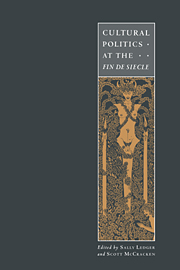Book contents
- Frontmatter
- Contents
- List of illustrations
- Notes on contributors
- Acknowledgements
- Introduction
- 1 The flight to the real
- 2 The New Woman and the crisis of Victorianism
- 3 Empire, ‘race’ and feminism at the fin de siècle: the work of George Egerton and Olive Schreiner
- 4 W. B. Yeats and Irish cultural politics in the 1890s
- 5 The double lives of man: narration and identification in late nineteenth-century representations of ec-centric masculinities
- 6 Henry James and the spectacle of loss: psychoanalytic metaphysics
- 7 ‘A very curious construction’: masculinity and the poetry of A. E. Housman and Oscar Wilde
- 8 The Pilgrims of Hope: William Morris and the dialectic of romanticism
- 9 Urban utopias: socialism, religion and the city, 1880 to 1900
- 10 Vampires and the empire: fears and fictions of the 1890s
- 11 Utopia, Limited: nationalism, empire and parody in the comic operas of Gilbert and Sullivan
- 12 Technologies of monstrosity: Bram Stoker's Dracula
- 13 Postmodernism, a Chance to reread?
- 14 Is market society the fin of history?
- Select bibliography
- Index
5 - The double lives of man: narration and identification in late nineteenth-century representations of ec-centric masculinities
Published online by Cambridge University Press: 29 September 2009
- Frontmatter
- Contents
- List of illustrations
- Notes on contributors
- Acknowledgements
- Introduction
- 1 The flight to the real
- 2 The New Woman and the crisis of Victorianism
- 3 Empire, ‘race’ and feminism at the fin de siècle: the work of George Egerton and Olive Schreiner
- 4 W. B. Yeats and Irish cultural politics in the 1890s
- 5 The double lives of man: narration and identification in late nineteenth-century representations of ec-centric masculinities
- 6 Henry James and the spectacle of loss: psychoanalytic metaphysics
- 7 ‘A very curious construction’: masculinity and the poetry of A. E. Housman and Oscar Wilde
- 8 The Pilgrims of Hope: William Morris and the dialectic of romanticism
- 9 Urban utopias: socialism, religion and the city, 1880 to 1900
- 10 Vampires and the empire: fears and fictions of the 1890s
- 11 Utopia, Limited: nationalism, empire and parody in the comic operas of Gilbert and Sullivan
- 12 Technologies of monstrosity: Bram Stoker's Dracula
- 13 Postmodernism, a Chance to reread?
- 14 Is market society the fin of history?
- Select bibliography
- Index
Summary
‘Men had to do fearful things to themselves before the self, the identical, the purposive and virile nature of man was formed.’
(Horkheimer and Adorno, Dialectic of the Enlightenment)citings/sitings
For the last decade or so, one project that has delimited the emerging field of lesbian and gay studies has sought to specify the conditions of possibility within which the category of the ‘homosexual’ emerged into Euro-American cultures and to explore the effects of this emergence. Whether its origins are situated somewhere in the early modern period, the sixteenth, eighteenth, or nineteenth centuries, the search for an ur-form of homosexuality has constituted a critical part of a contemporary effort to destabilize the ‘naturalness’ – if not the ‘normalness’ – of what we might now call procreative hetero-sexuality as the unmarked position from which all other forms of sexual practice can be understood as (at best) detours or deviations. Elaborating the crucial disarticulations of sex and gender undertaken by feminist critics and historians on the one hand, and genealogists of sexuality on the other, writings within lesbian and gay studies (including my own) have attempted to examine the multiple determinants which crystallized in and as ‘homosexuality’ in order to illuminate the complex historical processes whereby such categorical denominations are fixed as attributes of persons, acts, and/or bodies.
- Type
- Chapter
- Information
- Cultural Politics at the Fin de Siècle , pp. 85 - 114Publisher: Cambridge University PressPrint publication year: 1995
- 3
- Cited by



